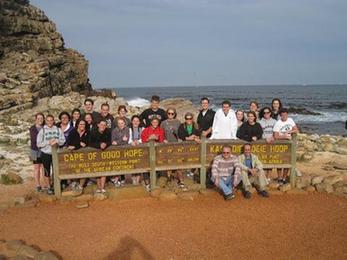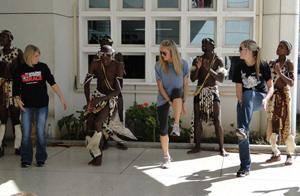
Each year, about a quarter of a million Americans study abroad. For many of them, a summer or a semester in a foreign country now involves more than just sitting in classrooms and hanging out with other American students. Instead, they are encouraged and sometimes required to be involved in the local communities they are studying in.
On his first morning in Beijing, one American study-abroad student was dropped off in a distant part of the Chinese capital with $5 and instructions to find his way back home on his own. It took a while, but he made it.
That's one example of how American students are being pushed out of their 'comfort zone' in order to fully experience another culture.
"It's absolutely crucial that they know something about how people in other parts of the world live and think and how they behave," says William Finlay, head of the sociology department at the University of Georgia. "Often those students go in large groups. They hang around each other. We felt that they really weren't getting to know the local inhabitants as well as they could."
In 2008, he co-founded a study abroad program with South Africa's Stellenbosch University. It combines traditional academic in-class learning with community involvement.
"We've been working with a particular NGO in the township and they do two things. They run a number of these crashes which are basically daycare centers for children whose parents are working and the library in the community with some computers. Our students typically work either with the little kids in the day cares or they work in the library and teach very basic computer skills to mostly young adults," says Finlay.
The three-week program proved to be a transformative experience for Hillary Kinsey.
"It was interesting to learn the history of the area and the recent development with democracy and that sort of thing," she says, "and then talk to these people and see what the social dynamics were, what the ethnic divisions were, how certain groups felt about other groups."

When the international affairs major returned from South Africa a few weeks ago, she and other students in the program established a non-profit.
"We called it 'Ubuntu,' which is a South African concept coined by Desmond Toto," she explains. "It means 'I am, because we are.' The idea is based around the relationships within the society and what generates prosperity for all. We took that notion and translated it into a larger international community."
Kinsey says the group wants to contribute to advancing education and development in South Africa.
"We have a lot of people that did not go to South Africa, but they are interested in this," she says. "And one of the purposes of our organization is that we hope to raise money and awareness for the situation of these people and try to facilitate building daycares there and helping to promote any sort of educational development we could through donations and fundraisers and that sort of thing."
While many study abroad programs focus on helping Americans learn foreign languages, some others take a more intensive approach.
"In all of our locations, we place students with local roommates," says Mark Lenhart, executive director of CET Academic Programs which sends more than 1,000 students to China, Jordan, the Czech Republic and other countries each year.

He says American students benefit from such one-on-one interactions, in spite of the challenges they face.
"Not just in terms of language learning, but they also find the local culture can present challenges, and perhaps misunderstandings," Lenhart says. "They have to adjust to local life. It's no longer okay just to have a little Chinese, for instance. If the student is studying Chinese, they want to come home from a program like this fluent in Chinese. So this will enable students to become more employable when they graduate."
Preparing American students to be more competitive in the global job market is one of the goals of the recent trends in study abroad.
Acording to Allen Goodman, president of the Institute of International Education, which promotes educational exchange. He says study abroad also prepares young people to become global citizens.
"You really can't have that global citizen perspective by just reading a book or just connecting to somebody who lives in Egypt on the Internet," Goodman says. "You have to go and see the reality of another place. That's what study abroad promotes."
IIE's Allen Goodman predicts that study abroad programs will continue to evolve and attract more students who find it a unique and valuable opportunity to learn about themselves and the world they're part of.
US boosts higher education exchanges with Indonesia
Can America win the education race?
Foreign students in US hits record enrollment
China passes India as top country sending students to US
(来源:VOA 编辑:Rosy)
